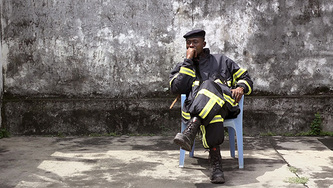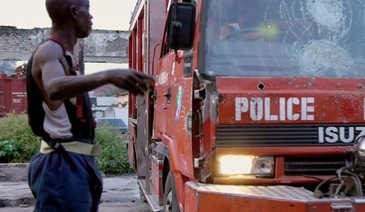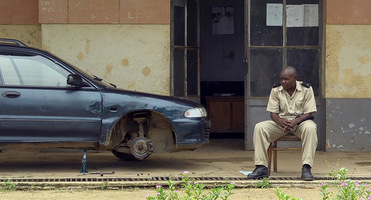
Headlines from The Congo in Africa portray it as a violent and inhumane place to live. With the spread of fatal disease, civil war and poverty, the mass hardship of the continent is known to the world. Yet in Kristof Bilsen’s documentary, Elephant’s Dream, the filmmaker aims to tell the inner struggles of the people by observing those who work for its public sector in Kinshasa, Africa’s third largest city. In the poetic documentary Bilsen lets the people tell their own stories and also offer reasons as to why their country is in such difficulties.

The film is the first feature length documentary by Kristof Bilsen. Previously the director had worked on a number of shorts that also highlighted social inequalities within African society. His previous short, White Elephant, was based around the same central post office which he describes as ‘a relic of the colonial past’ in his feature. With this film he has continued the points he stressed in his previous works with greater convictions.
The film intertwines between a number of workers as they convey their working life and the issues they face. Each personal or group has a different viewpoint and their stance on the issue. The men from the railway station seem more cynical and even angry about their current state. While Herietta from the post office seems hopeful that the system will come through.

Despite its bitter circumstances. the film is not all doom and gloom. Headlines of the African Congo may be dominated by stories of violence and chaos but here the film maker displays a real human side to the Congo. People, despite their hardships, living day to day. There are glimmers of hope amongst subjects despite a sadly bitter ending.
In terms of tone the film is a slow burning. At only an hour and fifteen minutes, it has a monotone pace. Yet what the film may lack it pace and action it makes up for in personal perspective. Rather than an outsider overseeing the structure of a documentary and giving view points and opinions on the state of each scenario it is the everyday workers that tell their own tales. Reasons such as corruption, outside interference, past injustices and even ingrained apathy are presented as courses to the countries issues.
An interesting, if slightly slow, portrayal of life in The Congo. The film's strongest point is that it feels to be told from the inside rather than an outsider observing yet the sheer lack of argument loosens the film maker’s argument.


 RSS Feed
RSS Feed
